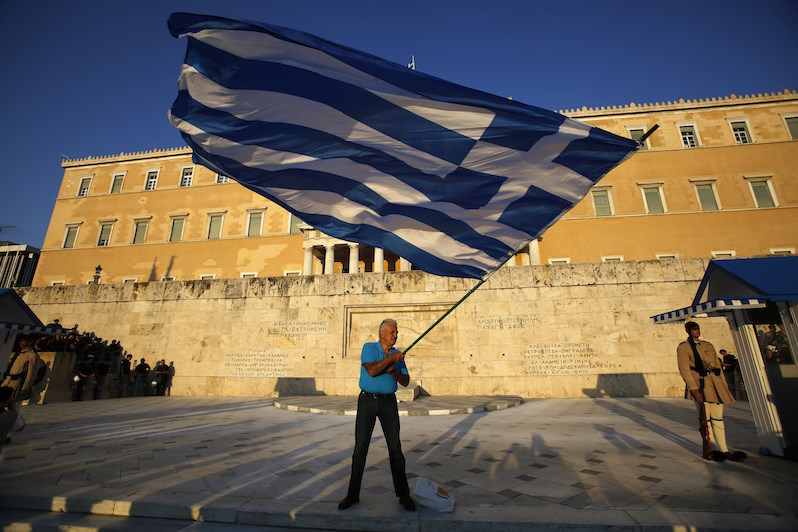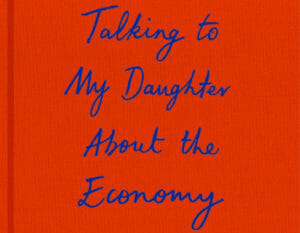Why the Greek Victory Inspires Us
While Greece is not the first country to defy the IMF’s prescriptions, it is uniquely poised to underscore, once and for all, capitalism's incompatibility with democracy. A demonstrator waves a Greek flag in front of the Parliament building as riot police, at left, block an entrance during a rally Thursday at Syntagma Square in Athens. (Petros Karadjias / AP)
A demonstrator waves a Greek flag in front of the Parliament building as riot police, at left, block an entrance during a rally Thursday at Syntagma Square in Athens. (Petros Karadjias / AP)
The Greek referendum against austerity is a major turning point for neoliberal capitalism and the Washington Consensus. As the world watched on Sunday, more than 60 percent of Greece’s voting public turned out to cast their ballots in the emergency measure called by Prime Minister Alexis Tspiras. Despite polls predicting a close race, 61.3 percent voted against what Finance Minister Yanis Varoufakis called “the damaging irrationality of our extend-and-pretend ‘Bailout Program.’ ”
Greeks are done with “austerity.” They chose democracy.
Greece is not the first nation to be subjected to ideological blackmail by the International Monetary Fund and Western banking institutions like the European Central Bank and European Commission, ominously dubbed “the troika.” Since the 1980s, scores of poor nations in the global south have endured the destructive rewriting of their welfare and socialist systems. Back then, under the auspices of the IMF and the World Bank, austerity was imposed under the rubric of “Structural Adjustment Programs” (SAPs).
The anti-poverty organization Oxfam, in a 2013 report about European austerity, reminded us of this historical context:
The European experience bears striking similarities to the structural adjustment policies imposed on Latin America, South-East Asia, and sub-Saharan African in the 1980s and 1990s. Countries in these regions received financial bailouts from the IMF and the World Bank after agreeing to adopt a range of policies including public-spending cuts, the nationalization of private debt, reductions in wages, and a debt management model in which repayments to creditors of commercial banks took precedence over measures to ensure social and economic recovery. These policies were a failure; a medicine that sought to cure the disease by killing the patient.
Decades of failed SAPs in poor countries should have been proof enough that such prescriptions do not work. But in the case of Greece, austerity was offered as sound policy, and even during negotiations, the IMF only belatedly revealed that the nation’s massive debt burden was unsustainable, and that Varoufakis’ mocking descriptor of the troika’s “extend and pretend bailout program” was accurate. In a detailed analysis and report released just days before the national referendum, the IMF concluded that Greece’s debt was unsustainable, even through 2030, and that “haircuts on debt will become necessary.” In other words, the Syriza Party’s demands that the troika write off a large chunk of Greek debt are utterly reasonable.
Despite this report, naysayers abound. Germany, Greece’s largest single creditor, refuses to acknowledge the legitimacy of Greek democratic expression. Vice Chancellor Sigmar Gabriel told the press that in pushing the referendum, Tspiras had “torn down the last bridges, across which Europe and Greece could move toward a compromise.” The New York Times wrote, “Greece risks paying a high price for [the vote] … If anything, Mr. Tsipras is likely to find it harder, rather than easier, to strike a new financing deal quickly with European creditors.”
But such sentiments are a desperate attempt to salvage the vestiges of respectability for austerity. In fact, Sunday’s referendum was a brilliant move by Syriza, forcing Europe’s leaders to accept the will of the Greek people, or risk exposing the hypocrisy of their supposed adherence to democratic values.
Already there are indications of a split within Europe over the Greek crisis. Germany, which leads the pro-austerity camp, has little moral ground to stand on given its history after World War II, when its own debts were forgiven under the Marshall Plan. French economist and best-selling author Thomas Piketty explained in a newly translated interview with Die Zeit that “Germany is really the single best example of a country that, throughout its history, has never repaid its external debt … However, it has frequently made other nations pay up.” Piketty added, “When I hear the Germans say that they maintain a very moral stance about debt and strongly believe that debts must be repaid, then I think: what a huge joke!”
Nowhere has there been a more effective mouthpiece for the democratic rejection of neoliberal capitalism than Varoufakis, an economics professor and unlikely politician. On the eve of the referendum, he declared unapologetically to the Spanish newspaper El Mundo, “Why did they force us to close the banks? To instill fear in people. And spreading fear is called terrorism.”Despite the resounding vote against austerity, Varoufakis stunned the world by resigning a day later. Either he was sacrificed to appease European officials whose ire he deftly provoked, or it was a brilliant and calculated move designed to hand Tspiras a bargaining chip. Either way, Varoufakis’ righteous anger over the destructiveness of austerity allowed Tspiras to remain above the fray. On his blog, he remained triumphant, saying, “I shall wear the creditors’ loathing with pride.”
Varoufakis’ articulation of defiance is exactly what is needed to fight en masse the corporate stranglehold on neoliberal capitalism that has impoverished so many for so long for the benefit of so few.
His comments on terrorism so offended European Commission President Jean-Claude Juncker that the New York Times described him as “sputtering in rage” while demanding, “Who are they and who do they think I am?” But the world needs more academics and activists who know exactly how to make the political establishment uncomfortable. For too long, elite ideologues have remained cloistered from popular sentiment, cocooned by etiquette.
The contagion that could stem from Varoufakis’ rhetoric and the Greek referendum represents the worst nightmare of both the troika and Germany. If Greece successfully shakes off the shackles of austerity when so much is at stake, including its membership in the European Union, then Spain’s Podemos Party could take heed. In fact, party leaders welcomed the referendum results, saying, “Today in Greece democracy won.” The ripple effect could be far and wide.
Others have defied Western financial institutions. Bolivia, under the leadership of Evo Morales, cast off the IMF and World Bank’s impositions and proved that socialist policies can alleviate poverty and balance books far more effectively than austerity and trickle-down economics. In fact, the IMF and World Bank ironically lauded Bolivia’s economic health.
Argentina, under Néstor Kirchner, also thumbed its nose at the IMF, defaulting on its debts in favor of protecting its economy. As Mark Weisbrot explained in The Guardian, eventually “the IMF backed down and rolled over the loans. Argentina went on to grow at an average of more than 8% annually through 2008, pulling more than 11 million people, in a country of 40 million, out of poverty.”
Nobel Prize-winning economist Joseph Stiglitz, a former World Bank executive, cited Botswana as one of the few resource-rich African countries that has managed to maintain a stable economy because, as he put it, “They told the IMF to go packing.”
In defying its creditors, Greece could have even wider repercussion than these other nations. For one thing, its position as a Western state within the European Union gives it greater clout. For another thing, today’s peer-to-peer communications over social media enable people to share ideas like never before. Already there is much public sympathy for Greece. An Indiegogo campaign launched by a 29-year-old Londoner named Thom Feeney raised nearly 2 million euros from more than 100,000 people worldwide. Although the campaign was more symbolic than practical, it illustrated a deep global solidarity with Greece. There also have been rallies in various European cities demanding that creditors write off Greece’s debts.
What will happen next remains unclear. But a few things are certain: Greece cannot sustain more debt, nor can it withstand more cuts. Since following the troika’s demands will lead only to more pain, spurning the austerity model offers the only hope for a long-term solution.
Your support matters…Independent journalism is under threat and overshadowed by heavily funded mainstream media.
You can help level the playing field. Become a member.
Your tax-deductible contribution keeps us digging beneath the headlines to give you thought-provoking, investigative reporting and analysis that unearths what's really happening- without compromise.
Give today to support our courageous, independent journalists.





You need to be a supporter to comment.
There are currently no responses to this article.
Be the first to respond.